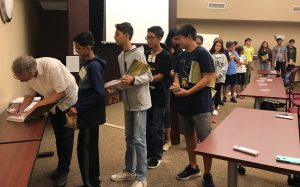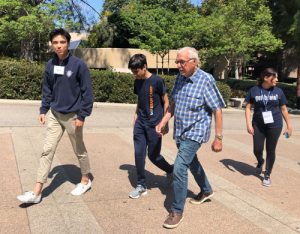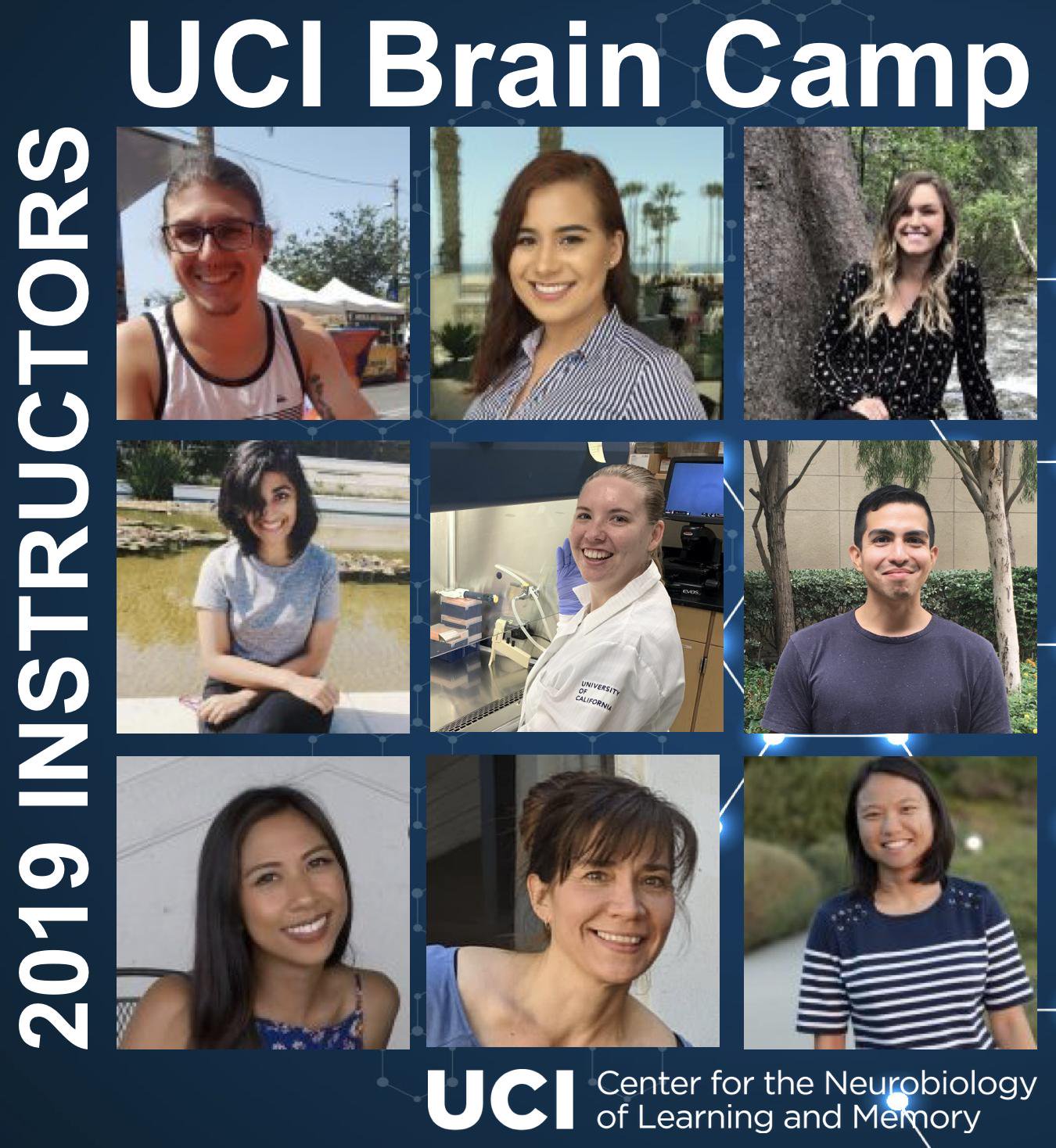UCI Brain Camp prepares children for careers in science
This summer, 35 middle and high school students spent 2 weeks at UCI participating in a one-of-a-kind immersive neuroscience camp. UCI Brain Camp, founded and directed by Manuella Yassa of the Center for the Neurobiology of Learning and Memory, is one of only a handful of summer K-12 neuroscience programs in the country.

UCI Professor Georg Striedger signed each Brain Camper's textbook, Neuobiology: A Functional Approach. Dr. Striedter wrote an aspirational note to each student.
“We designed the program to provide an immersive experience in neuroscience where students could learn from many different scientists in a variety of different settings,” – Manuella Yassa.
The typical day included a faculty lecture, laboratory tour, lunch with neuroscientists and hands-on workshops in small groups. On Day 1, each student received a copy of Neurobiology: A Functional Approach, a college-level textbook written by UCI Professor Georg Striedter who presented the first faculty lecture of the camp.
Students also heard from other faculty including world-renowned sleep expert and Chair of the Department of Psychiatry and Human Behavior, Dr. Ruth Benca as well as both the Director and Associate Director of the CNLM, Drs. Michael Yassa and Sunil Gandhi.

Dr. James McGaugh, UCI founding faculty and memory giant, walks students to McGaugh Hall after his lecture.
A highlight for many of the students was getting a glimpse of the history of the university and the field of learning and memory by meeting UCI Founding Faculty and memory giant, Dr. James McGaugh.
“It was fun to meet the real professors who do the research that we read about in textbooks. I got to meet so many amazing new people,” – 11thgrade Brain Camp participant.
The engine of the UCI Brain Camp was the science mentor team, a group of nine doctoral neuroscience students who worked with the campers in small groups, facilitating discussions of complicated neuroscience concepts and leading meaningful hands-on experiences. “The science mentors worked with the students not only to teach them the fundamentals of neuroscience but to show them that scientists are real people who have real questions and that a career in science is achievable and diverse,” says Yassa. The relationship is mutually beneficial, with the science mentors gaining valuable experience in teaching, scientific communication and service.
“I was impressed by the in-depth, stimulating questions and discussions. These students have intellect beyond college years with the energy and enthusiasm of teens/young adults, which makes for incredibly motivated and bright scientists and such a joy to be around!” – Doctoral student and Brain Camp Instructor Michelle Ren.
After completing the crash course in neuroscience fundamentals, experimental design and statistics, the students were tasked with asking their own scientific questions and designing experiments to test their hypotheses.
Campers spent the first week filling their toolboxes with the knowledge and skills necessary to be neuroscience researchers. This included an understanding of how the brain works – how the brain evolved, how it is organized, what it is made of, how neurons communicate with each other, what happens when the brain doesn’t work, etc. In addition to understanding what we already know about the brain, campers learned what tools researchers use to study the brain in the laboratory. This included how to record from and stimulate neurons, how to use animal models, how to measure various aspects of memory and cognition and more.
"I loved helping the kids design their experiment, it was so fun to watch them think critically about experimental design. One of them told me that he especially enjoyed the challenges that come with running an experiment, not knowing if it would work out in the end but he was so excited when they actually got significant results," – Doctoral student and Brain Camp Instructor Morgan Coburn.

Brain Camp participants acquired lifelong skills including critical thinking, observation, analysis, and collaboration.
With a full toolbox, eight groups of campers set out to run their own experiments using cockroaches and humans as their test subjects. Questions included: does chewing peppermint gum improve concentration? how does sugar affect memory? how does stress affect learning? Campers worked diligently to collect and analyze their data and to create a poster, which each group presented on the last day of camp. The goal of the exercise was to simulate real science. The students generated their own questions that they were genuinely interested in exploring. They determined which tools to use and they worked together in teams to conduct the experiment. “The skills they learned in critical thinking, observation, analysis, collaboration and public speaking will be valuable in whatever career they pursue,” says Yassa.
The most frequently asked question by campers and their parents on the last day of camp - what’s next? Yassa plans to offer the foundations in neuroscience camp again next year, with registration opening in October. Additionally, the team is working on designing a second, more advanced camp to allow those who participated this year to extend their knowledge and gain more experience in neuroscience.
Find out more by visiting the camp’s website at cnlm.uci.edu/braincamp and sign up to receive more information.
"I wanted to thank you for the amazing time that I had at Brain Camp this year! I loved all of the lectures, especially Dr. Steven Mahler's lecture on addiction and Dr.Yassa's talk on how an MRI functions! All of these inspiring professors have reinforced my determination to pursue a path in neuroscience! Everyone at the camp was so friendly and welcoming and I have definitely made some friends for life! I hope to come back to UCI next summer and be able to participate in research!" – 11th Grade Brain Camp Student.
